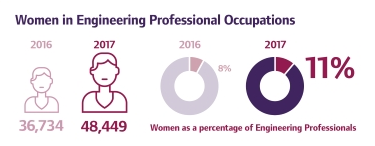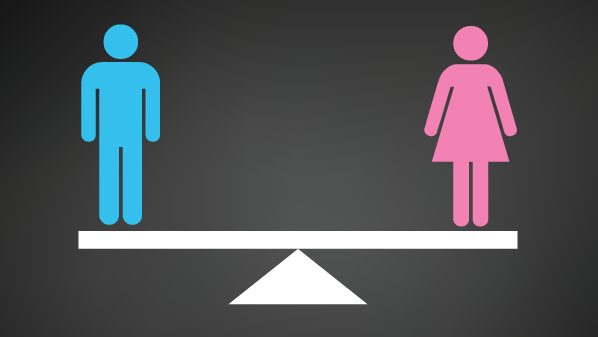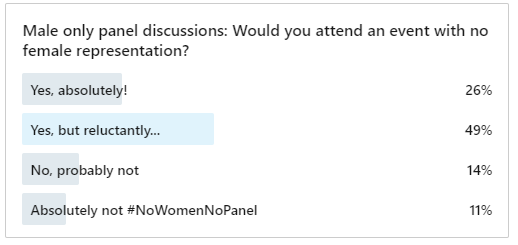The unseen consequences of all male panels (#Manels)
In 2020, can we support all-male panel events and still expect to be successful in advancing gender equality? With such events deterring 1 in 4 women participating perhaps we need to re-think what our panels look like.
In this article, I discuss #Manels, their unseen consequences and positive steps we can each take in the relentless pursuit of living and working inclusively. I note that factors such as age and race were not considered in the scope of this article, however I am interested to understand if similar conclusions could be drawn from equivalent investigations.
Invisible women
Is it just me or does everybody notice the visible lack of women in the conversation across the infrastructure sector? It’s a little odd to me because there’s no shortage of remarkable women in my day to day working life but something mysterious seems to happen at events where women appear to have, well, disappeared.
Since joining the board for the Women's Infrastructure Network I’ve picked up this annoying habit of being incredibly aware of the representation of women in a given forum whether that’s a meeting, workshop or event.
The Women’s Infrastructure Network has over 1400 members from across the infrastructure sector with representation in: Transportation, Energy, Defence, Water, Government, Telecommunications, Banking, Finance and Legal.
So when I came across an event on Nuclear Asset Management hosted by the Institution of Engineering and Technology (IET) it was very hard for me not to notice the fact there were no women included on the panel – I had found myself a #Manel (A panel made up exclusively of men. In this instance 4 men and 0 women).
The current diversity challenge in engineering
Only 11% of the engineering workforce is female – Women in STEM workforce, WISE Campaign, 2017
With only 11% of the engineering workforce being female in 2017 it seems there are still barriers to participation in the field. As one of the largest engineering institutions promoting their commitment to championing equality, diversity and inclusion within the profession it didn’t make sense that this could be correct.
I proceeded to scroll up, re-read and confirm this was unfortunately not my mistake.
And it got me wondering…
Can organisations support #Manels and still be successful in advancing gender equality?
I concluded: Not really. Here’s why...
#Manels do not offer women career advancing opportunities
Panel discussions offer a platform for speakers to share their experiences and perspectives. This helps panellists develop their personal brand, build their network and provides the opportunity to be recognised as thought leaders amongst their peers.
If there are no panel positions filled by women, then they are excluded from these career advancing opportunities.
While a single event failing to secure a woman for their panel may sound insignificant at first glance, there are a cascade of implications that follow on from this.
#Manels do not offer women much needed role models
The importance of role models for women is essential when it comes to attracting and retaining female talent within engineering (and other STEM fields). If there are no panel positions filled by women, then there are no visible role models for female attendees.
#Manels actually discourage women from participating
The Women's Infrastructure Network is a forum for women within the infrastructure sector to network, exchange ideas and help shape the infrastructure agenda. A poll of the membership reflects how an all-male panel would influence their participation as an attendee at such an event. The results were insightful.
75% of WIN members surveyed would attend an all-male panel event. The majority of those however, would do so reluctantly (49%). Membership discussion suggests that drivers behind reluctant attendance were related to recognising the need to attend being present and part of the discussion, however, that the event did not include one of the many talented women in the field. Women who, given the chance, could have invaluably contributed to the discussion.
Unfortunately all male panels are commonplace in the engineering and utilities sectors, but it’s extremely disappointing to see. I do think it’s important for panels to be diverse and I think event organisers have a duty of care to consider diversity in putting a panel together to encourage a challenging and healthy debate.
However on the flip side I wouldn’t want to miss attending an event and limit female input even further by not being present, especially if there was an opportunity to network with some great thought leaders (some of whom could be women!).
Claire Spencer, Risk and Investment Manager, Northern Gas Networks
25% of WIN members surveyed would probably (or absolutely) not attend an all-male panel event. Membership discussion suggests that drivers behind discouraged attendance were related to candidate attendees perceiving the event to be poorly organised (based on the inability to secure at least 1 female panellist) and delivering an uninspiring and limited discussion.
Every technical event, no matter how big or small, is an opportunity to help change outdated perceptions of what technical experts look like. This is vitally important for the future of our industry. It’s so disappointing to see all male panels as the experts given a platform as role models for the audience. ‘You can’t be what you can’t see.’ It might be harder work, but organisers need to look beyond their usual networks to find expert women for their panels, because they do exist!
Alexandra Knight - Founder, Stemazing Ltd
So what does this poll tell us? Well, all-male panels in the infrastructure sector will draw female attendees, but this is a smaller proportion than if the panel had female representation and the majority will be reluctant to attend. Alarmingly, the unseen consequences of these events are that they deter participation by lack of representation. If there are no panel positions filled by women, then 1 in 4 women from the event target audience won’t show up!
If a subject is worth enough to warrant a panel discussion then it requires diversity of opinion and thought, whether that is gender, age, race etc. In a world where women make up half the population, it is incredible to think we wouldn’t be on a panel - having an all male panel suggests a lazy approach to Diversity and Inclusion from an organisation.
Sophie McDermott - Founder and Director, Women’s Writes
The future
Given the cascade consequences of #Manels it’s imperative that we work together across all industries to ensure women are represented on our panels, encouraged to contribute their diverse viewpoint to the discussion and visible to the next generation of female talent.
Here’s a 3-tiered approach that each of us can consider when looking to make a positive impact:
1) Organisations - Organisations, such as the IET, can choose to not run events which do not have female representation on their event panels (#NoWomenNoPanel).
2) Panellists - Candidate panellists can choose to take the pledge (founded by Owen Barder) – a personal pledge to not support panels lacking in gender diversity.
At a public conference I won’t serve on a panel of two people or more unless there is at least one woman on the panel, not including the Chair - Owen Barder
3) Individuals – Individuals can continue to (politely) challenge panellists, event organisers and host organisations where panels lack diversity for the benefit of their respective industry as a whole.
One thing is clear, the future challenges we face in the infrastructure sector are significant, increasingly interdependent and evolving. We need people with diverse skills, experiences and backgrounds to create innovative solutions to meet these challenges – My view is that we can’t afford to exclude anyone from the discussion, so…
What will you do?
This article forms part of a Speak Out Challenge, a bitesize inclusion challenge designed by our members for our members to encourage small actions for positive change. Get involved today, take the challenge here.






